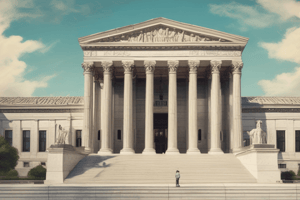Podcast
Questions and Answers
What is the primary focus of Supreme Court justices once they are appointed?
What is the primary focus of Supreme Court justices once they are appointed?
- Influencing public opinion
- Interpreting the law (correct)
- Engaging in politics
- Overturning previous court decisions
How many justices make up the Supreme Court?
How many justices make up the Supreme Court?
- 11
- 7
- 9 (correct)
- 12
What role do political considerations play in the appointment of Supreme Court justices?
What role do political considerations play in the appointment of Supreme Court justices?
- A minor role
- No role at all
- A significant but indirect role (correct)
- The primary role
What is the significance of lifetime appointments for Supreme Court justices?
What is the significance of lifetime appointments for Supreme Court justices?
In what way do Supreme Court justices maintain the integrity of the legal system?
In what way do Supreme Court justices maintain the integrity of the legal system?
What is the key power of the United States Supreme Court mentioned in the text?
What is the key power of the United States Supreme Court mentioned in the text?
Which branch of government has the power to determine if laws conform to the U.S. Constitution?
Which branch of government has the power to determine if laws conform to the U.S. Constitution?
Who first exercised the power of judicial review in the United States according to the text?
Who first exercised the power of judicial review in the United States according to the text?
Under what circumstances can the U.S. Supreme Court declare laws void?
Under what circumstances can the U.S. Supreme Court declare laws void?
What important principle was established by Chief Justice John Marshall in Marbury v. Madison (1803)?
What important principle was established by Chief Justice John Marshall in Marbury v. Madison (1803)?
Flashcards are hidden until you start studying
Study Notes
Overview of the United States Supreme Court's Judicial Review Powers and Justices
The Supreme Court is the highest court in the United States federal court system and serves as the final authority on matters related to the interpretation of the U.S. Constitution. One of its key powers is called 'judicial review', which grants it the ability to strike down legislative acts if they conflict with the constitution. This power has been a point of contention throughout American history, particularly during times when the Court made decisions that were unpopular or polarizing among public opinion.
Judicial Review
Judicial review allows the Supreme Court to determine whether laws passed by Congress or executive orders issued by the President conform to the principles embodied in the Constitution. If the Court finds that these actions exceed congressional or presidential authority, it can declare them void under Article I, Section 8 of the Constitution. In other words, this power means that the Court can invalidate any law, act or policy of any branch of government that does not comply with the text of the constitution itself.
This important check on governmental power was first exercised by Chief Justice John Marshall in Marbury v Madison (1803), where he established the principle that courts have the right to interpret the statutes being applied and to hold administrative action to be inconsistent with the framework of rights provided by those statues. Since then, the Supreme Court has continued to exercise this power extensively over time.
Supreme Court Justices
The Supreme Court consists of nine judges appointed by the President of the United States with advice from the Senate. These justices serve lifetime appointments, meaning they remain on their positions until retirement or death. They are nominated based on many factors such as their personal traits like intelligence, character, temperament, and experience. Once appointed, however, their primary focus becomes interpreting the law rather than politics, although political considerations do play some role due to their appointment process. For instance, a justice who supports conservative policies will often nominate another judge who shares his or her ideology.
In summary, while serving as an arbiter between branches of government through judicial review, the Supreme Court also plays a crucial role in maintaining the integrity of our legal system by ensuring that all laws and policies enacted adhere strictly to constitutional limits. Similarly, individual Supreme Court justices wield significant influence over the law because their rulings may affect millions of Americans for decades into the future.
Studying That Suits You
Use AI to generate personalized quizzes and flashcards to suit your learning preferences.




